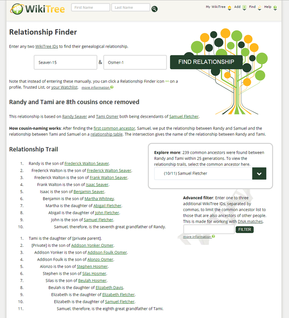 Click on image for a larger view. Click on image for a larger view. This press release was just received from WikiTree. While I have a tree on WikiTree, it's not my main tree, but as I have delved into DNA testing and the myriad of ways to analyze the data, these 2 new DNA tools are going to be very helpful to me. And coming to that conclusion this morning, I logged onto my WikiTree tree and explored their DNA tools and other new-to-me tools early this morning. I added a few more people like siblings, merged some duplicates, looked at a merged ancestor a distant cousin had made for us with a common ancestor, and looked at all the of WikiTree's DNA tools which I had not even looked at before. Then I added all my DNA tests and info to my tree. It takes a while for that information to get processed, I think, but what I found was that the information in general that WikiTree provides about DNA and DNA testing would really help others who have taken DNA tests for genealogy and are lost with their results. They really do a good job of explaining DNA for genealogy and what other DNA tests you need to get and why for confirming your research. The navigation on the site is not as intuitive as I'd like, but if you're willing to click on all the links to find information, then you will be rewarded. So, you have to "play" with it. [But, hey, another weekend is just about here. ;) ] Read their press release below which explains their new DNA tools. ~Caroline FOR IMMEDIATE RELEASE: November 6, 2014
Contact: Eowyn Langholf, [email protected] WikiTree Makes Finding Relationships with DNA Matches Easier 6 November 2014: Today WikiTree.com is announcing two important features for genealogists who have taken DNA tests. These features make WikiTree’s Relationship Finder a uniquely powerful tool for genealogists who have taken 23andMe, AncestryDNA, and FTDNA Family Finder tests. “One of the biggest challenges facing genetic genealogists,” according to Dr. Blaine Bettinger, author of the long-running blog The GeneticGenealogist, “is finding the elusive common ancestor. Finding genetic matches is easy, but finding the common ancestor from whom we inherited a segment DNA is very hard. WikiTree’s new Relationship Finder is a great tool for identifying the ancestors that two or more people share in common.” All Common Ancestors Genealogical relationship finders are generally designed to find the first common ancestor between two people. Genetic genealogists need to know about all the common ancestors they share with a match. Everyone’s family tree intertwines in multiple ways. The first shared ancestor may not be the reason for a shared segment of autosomal DNA. WikiTree’s Relationship Finder now enables you to easily browse all your common ancestors. Filtering for Multiple Matches When a genealogist shares a segment of autosomal DNA with two or more other people who also match each other on that segment, it’s a big clue in discovering which ancestor it came from. WikiTree’s Relationship Finder now enables you to filter the common ancestors shared by two people to only display common ancestors who are also shared by a third, fourth, or fifth person. The Universal Family Tree These Relationship Finder features are possible because WikiTree members are collaborating on a single tree for the entire human family. “The genetic genealogy community absolutely must have a universal family tree,” says leading genetic genealogist Dr. Tim Janzen. “With smaller unlinked trees it's frequently impossible to see all of the true genealogical connections with the people who share autosomal DNA with us. We are finally getting to the point where this vision is becoming a reality at WikiTree.” About WikiTree WikiTree: The Free Family Tree has been growing since 2008. Community members privately collaborate with close family members on modern family history and publicly collaborate with other genealogists on deep ancestry. Since all the private and public profiles are connected on the same system this process is helping to grow a single, worldwide family tree that will eventually connect us all and thereby make it free and easy for anyone to discover their roots. See http://www.WikiTree.com.
0 Comments
|
Categories
All
Archives
February 2017
|
|
© Copyright For Your Family Story 2016 - All Rights Reserved
|

